Treating DKA with Sub-Q Insulin?
What are the treatment options for people with type 1 diabetes with a COVID infection hospitalized for Diabetes KetoAcidosis (DKA)?
The typical treatment for DKA is fluids coupled with an IV insulin drip. Given the frequent monitoring and ICU bed required for treatment of DKA with an insulin drip, there has been a renewed interest in treating DKA with subcutaneous or sub-q insulin.

But after doing some research, I discovered an excellent 2004 paper co-authored by Dr. Guillermo Umpierrez et al. on using Sub-Q Insulin to Treat DKA. After completing a study comparing treatment of DKA using sub-q insulin vs. insulin drip, the author’s conclude that sub-Q insulin treatment is a safe and effective alternative treatment to IV insulin in the management of people with mild or moderate DKA.
With a little more digging, I found 2 more recent papers that suggest considering Sub-Q insulin treatment as an option for mild or moderate DKA.
It is important to note that sub-Q insulin treatment for DKA is NOT recommended for patients with arterial hypotension, severe and complicated DKA, or with HHS.
Treating DKA with Sub-Q insulin Steps
Insulins: Use either rapid acting lispro or aspart insulin.
1st Bolus: Starting dose is 0.1 or 0.2 or 0.3 units/kg of insulin (depending on initial blood glucose and clinical presentation)
Example: Pt weighs 100 kg, give 100kg x 0.1 – 0.2 – 0.3 units/kg of insulin = 10 or 20 or 30 units insulin sub-q bolus respectively.
Next Step – Sub-q insulin every 2 hours | Give 0.1 – 0.2 units of insulin /kg every 2 hours until blood glucose is less than 250.
Example: Pt weighs 100 kg, give 100kg x 0.1 – 0.2 units/kg of insulin = 10 or 20 units insulin sub-q bolus respectively every 2 hours.
Blood glucose less than 250 | Now give 1/2 the sub-q insulin dose every 2 hours. Calculate 0.05 to 0.1 units/kg every 2 hours until glucose at target and ketosis is resolved.
Example: Pt weighs 100 kg, give 100kg x 0.05 – 0.1 units/kg of insulin = 5 or 10 units insulin sub-q bolus respectively every 2 hours.
Using scheduled subcutaneous insulin allows for safe and effective treatment in the emergency room and step-down units without the need for ICU care. Umpierrez et al
Please see reference chart and articles below for more detailed information.
Fluids and Electrolytes
Of course, fluid and electrolyte status needs to be assessed before starting insulin.
If the K+ is less than 3.3, hold insulin and start with IV fluids (NS or LR) first with potassium replacement. Once the K is stable, start the insulin injection every 2 hours (see article and flow chart below).
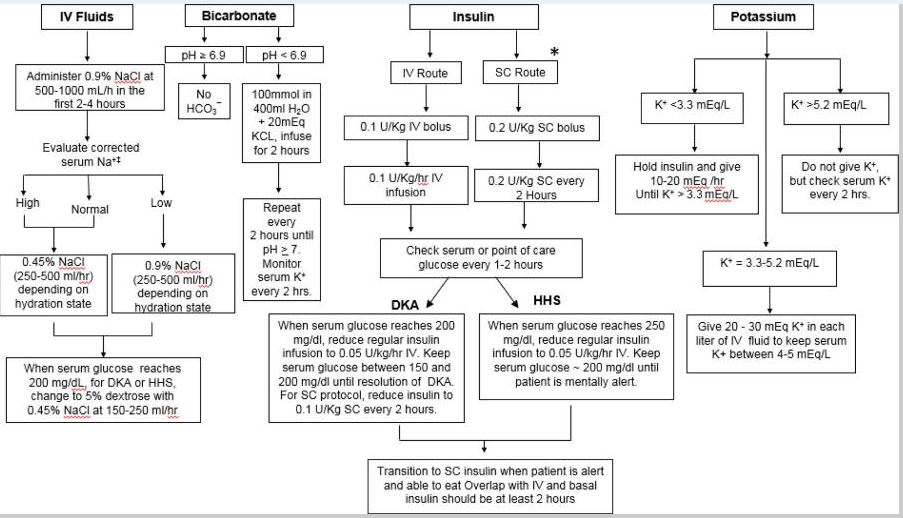
doi: 10.1016/j.mcna.2016.12.011
Management of Hyperglycemic Crises: Diabetic ketoacidosis and hyperglycemic hyperosmolar state
Thank you for reading this article. Please share any feedback or your experiences using sub-q insulin for DKA. We always love to hear from you. You can email us at [email protected]
Reference Articles
Eledrisi MS, Elzouki AN. Management of Diabetic Ketoacidosis in Adults: A Narrative Review. Saudi J Med Med Sci. 2020;8(3):165-173. doi:10.4103/sjmms.sjmms_478_19
Fayfman M, Pasquel FJ, Umpierrez GE. Management of Hyperglycemic Crises: Diabetic Ketoacidosis and Hyperglycemic Hyperosmolar State. Med Clin North Am. 2017;101(3):587-606. doi:10.1016/j.mcna.2016.12.011
Hyperglycemic Crises, DKA & HHS | 1.0 CEs
Join Coach Beverly to learn more about causes and treatment of hyperglycemic crisis. (opens in a new tab)”>Find out more here>>

This course is included in: Level 2 – Standards of Care. Purchase this course individually for $19 or the entire bundle and save 70%.
This 60-minute course discusses common causes of hyperglycemia crises. Topics include hyperglycemia secondary to medications and insulin deprivation. The difference and similarities between Diabetes Ketoacidosis and Hyperosmolar Hyperglycemic Syndrome are also covered. Treatment strategies for all situations are included.
Topics include:
- Common causes of hyperglycemic crises.
- The difference and similarities between DKA and HHS and treatment strategies
- Causes and treatment of hyperglycemic crises.
Sign up for Diabetes Blog Bytes – we post one daily Blog Byte from Monday to Friday. And of course, Tuesday is our Question of the Week. It’s Informative and FREE! Sign up below!
[yikes-mailchimp form=”1″]
Accreditation: Diabetes Education Services is an approved provider by the California Board of Registered Nursing, Provider 12640, and Commission on Dietetic Registration (CDR), Provider DI002. Since these programs are approved by the CDR it satisfies the CE requirements for the CDCES regardless of your profession.*
The use of DES products does not guarantee the successful passage of the CDCES exam. CBDCE does not endorse any preparatory or review materials for the CDCES exam, except for those published by CBDCE.
Prep for CDCES Exam 2021 Free Webinar | January 25th
Studying for the CDCES exam?
Join Coach Bev for a FREE Webinar with updates on the CDCES Exam 2021
January 25, 2021, from 11:30 a.m. – 12:45 p.m. (PST)
Unsure about updates for this mastery level 2021 exam?
Join us to get ready to succeed a the CDCES Exam. This course will transform your test anxiety into calm self-confidence and test-taking readiness.
Topics Covered Include:
- Changes in test philosophy for 2021
- Exam eligibility and test format
- Strategies to succeed
- Review of study tips and test-taking practice questions.
We will review sample test questions and the reasoning behind choosing the right answers. After registering, you will receive a confirmation email containing information about joining the webinar.
See our Prep for CDCES Resource Page
Instructor: Beverly Thomassian RN, MPH, CDCES, BC-ADM is a working educator who has passed her CDCES Exam 6 times. She is a nationally recognized diabetes expert for over 25 years.
ADCES Desk Reference 2020 + 5th Ed Review Guide Book Bundle
The 5th Edition ADCES Desk Reference & 5th Edition Review Guide Bundle –our most popular AADE Book Bundle for exam preparation!
What is included in the ADCES Book Bundle?
The Art & Science of Diabetes Self-Management Education Desk Reference – 5th Edition
Major Features:
- practical information educators can use with patients to avoid complications and comorbidities
- risks and benefits of CGM and the educator’s role in working with patients who use CGM
- updated info on incorporating the ADA, AADE, and AND joint position statement and algorithm of care into a DSME program
ADECES Review Guide for the Diabetes Care and Education Specialist Exam – 5th Edition
Includes an answer key with rationales for all questions included in the guide!
Major Features:
- 480 + multiple-choice questions
- Strategies for preparing for and taking the exam
3 self-assessment tests that cover three main content sections on the CDCES Exam:
- Assessment of Diabetes and Prediabetes
- Interventions for Diabetes and Prediabetes
- Disease Management
Sign up for Diabetes Blog Bytes – we post one daily Blog Byte from Monday to Friday. And of course, Tuesday is our Question of the Week. It’s Informative and FREE! Sign up below!
[yikes-mailchimp form=”1″]
Accreditation: Diabetes Education Services is an approved provider by the California Board of Registered Nursing, Provider 12640, and Commission on Dietetic Registration (CDR), Provider DI002. Since these programs are approved by the CDR it satisfies the CE requirements for the CDCES regardless of your profession.*
The use of DES products does not guarantee the successful passage of the CDCES exam. CBDCE does not endorse any preparatory or review materials for the CDCES exam, except for those published by CBDCE.
Rationale of the Week | 4 Meds and A1c of 8.9%

For our January 12th Question of the Week, over 58% of respondents chose the best answer!
Before we start though, if you don’t want any spoilers and haven’t tried the question yet, you can answer below: Answer Question
Question:
JR is on metformin 2000mg, empagliflozin 25mg, semaglutide 1.0mg, and 100 units of glargline insulin. A1C is 8.9% and JR weighs 100kg.
What best describes this clinical picture?
Answer Choices:
- Overbasalization
- Non-compliance
- Fear of hypoglycemia
- Clinical inaction
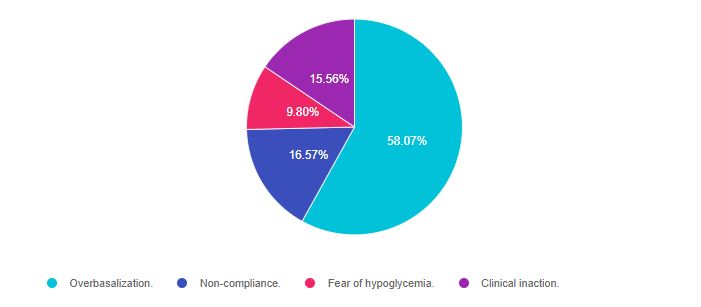
As shown above, the most common choice was option 1, the second most common answer was option 2, then option 4, and finally option 3.
Getting to the Best Answer
If you are thinking about taking the certification exam, the content of this practice test question will set you up for success. It addresses a common ADA Standard 9 and approaches to managing hyperglycemia with type 2 diabetes. This standard is brief with very helpful tables and algorithms. A must-read section for anyone ready to be more actively involved in advocacy and pharmacologic management of diabetes.
Answer 1 is correct. 58.07% chose this answer. ” Overbasalization.” This is the best answer, because JR is on 3 diabetes medications plus 100 units of basal insulin, and their glucose is still above target. This treatment plan isn’t working. If we look at the ADA Guidelines, (section 9 outlined on a slide below), it states if the basal insulin is more than 0.5 units/kg/day, we need to take further action.
Too much basal
JR weighs 100kg. The max dose of basal insulin based on his body weight should be 50 units (100kg x 0.5 = 50 units). Yet, JR is on 100 units. What are possible solutions?
Getting to basal + bolus
According to ADA Algorithm, we could add 10% of the current basal as bolus insulin, or 10 units one or two meals a day.
Or we could convert it to combo insulin, like 70/30 insulin. To do that conversion, first, decrease total basal insulin by 80% for safety.
100 units x 0.8 = 80 units. Then give 2/3 in the morning and 1/3 before dinner.
80 x 2/3 = about 50 units in the morning and 80 x 1/3 or about 30 units before dinner. If worried about potential hypoglycemia, the dose could be decreased even further. The main goal is to get glucose to the goal.
Answer 2 is incorrect. 16.57% of you chose this answer. “Non-compliance.” According to the information in the case study, JR is taking all of the medications as directed. The issue is that the medication plan is not effective. And, more than that, the term “non-compliance” has been replaced with focusing on the person’s strengths (strength based approach) and what the actions the individual IS taking.
Answer 3 is incorrect, 9.80% of you chose this answer “Fear of hypoglycemia.” The answer is tempting. Since JR is on 100 units of basal insulin, hypoglycemia seems like a looming possibility. However, we see that the A1c is 8.9% and JR doesn’t mention hypoglycemia. It is very unlikely that low blood sugar is an issue.
Answer 4 is incorrect, 15.56% of you chose this answer. “Clinical inaction.” It is true that more action is required, and the term we use for this is lack of movement to improve glucose levels is called “Clinical inertia”. However, in answering the question, “what best describes this clinical picture”, “overbasalization” is the standout answer.
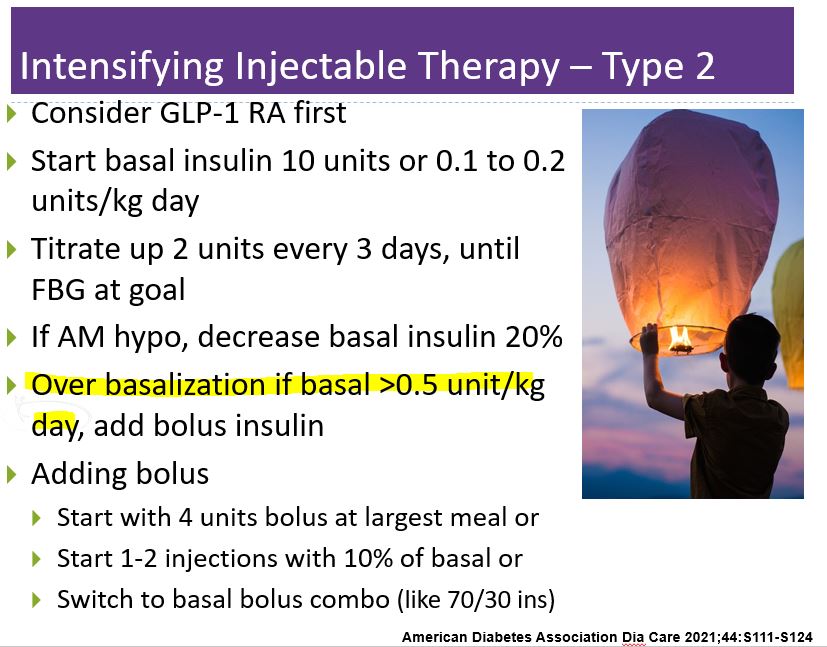
We hope you appreciate this week’s rationale! Thank you so much for taking the time to answer our Question of the Week and participate in this fun learning activity!
Sourdough, Stress, & Salad | Dawn DeSoto
Humans are hard-wired to seek comfort and relief in moments of stress.
Biologically, this is called homeostasis, which means maintaining a steady state of balance.

With the ongoing trauma of the pandemic, many of us are seeking comfort and a way to occupy our minds. Many people have adopted new hobbies to keep themselves busy, with sourdough bread baking being a popular choice. Bread products are comfort for many of us. I have not made bread as many others have, but I have been craving bread products and eating more bread, potatoes, and ice cream.
“Anything that challenges our state of balance, or any situation of lack, is deemed a stressor. This could be hunger, an uncomfortable position, feeling cold, or feeling afraid or insecure,” Dr. Eva Selhub, resiliency expert explains.
This feeling triggers an automatic reaction to leave or alleviate the uncomfortable situation, like putting on something warm if you are cold, or overeating when you are feeling insecure.
“By addressing the problem, the brain’s reward centers are stimulated along with the release of neurotransmitters like dopamine and serotonin”, continues Dr. Selhub.
At the same time, the stress hormone cortisol goes down. Solving a discomfort, then, gives us a sense of euphoria and ease. Also, carbohydrates especially lead to the increase of serotonin, the happiness hormone, which gives us the sense of feeling better.
According to Julie Ohana, a culinary art therapist, (culinary art therapy helps people communicate and manage stress through cooking), “there is a big reason people have been stress baking. When times are turned upside down we look for ways to cope”, she says. “The heart of the explanation is that cooking and baking bring comfort. The process helps aid the baker and the finished product helps comfort the person or people receiving the delicious outcome. Having control over something right now is important since so much in the world is unknown and out of our hands. When I am in the kitchen, I know what I can expect. For many, the act of baking is also calming because baking is a form of mindfulness. When we are inundated by the news and scary information, it’s important that we all take time away from the scary stuff and reset our minds and thoughts.”

Cooking sourdough bread and binge eating carbohydrates might be physiologically and psychologically comforting for some, but for our clients living with diabetes, carbohydrate cravings and binge eating can play havoc on blood sugar control, weight management, and emotional health. I had a client confide in me that when a friend brought her a warm loaf of sourdough bread she ate the whole loaf in one sitting.
TW: Mention of eating disorders below
Binge eating disorder (BED) is a severe, life-threatening, but treatable eating disorder. It is characterized by periods of uncontrolled, impulsive, or continuous eating beyond the point of comfortably full. BED is one of the newest eating disorders formally recognized in the DSM-5. Bulemia is characterized by recurrent binge eating with purging. Anorexia is centered around an obsessive fear of weight gain and involves self-starvation and often excessive weight loss. Eating disorders affect 9% of the population. 28.8 million Americans will have an eating disorder in their lifetime. Eating disorders are among the deadliest mental illness, secondary only to opioid overdose. The global economic cost of eating disorders is $64.7 billion annually. (1)
Hotline calls to the National Eating Disorders Association are up 70-80% since the beginning of the pandemic. “The risk of eating disorders is going to increase whenever there are higher levels of stress,” Lauren Smolar, Senior Director for the National Association of Eating Disorders tells us.
A survey in the International Journal of Eating Disorders in July found 62% of people in the US with anorexia experienced a worsening of symptoms as the pandemic hit. Nearly a third of Americans with binge eating disorder reported an increase in episodes. (2)
Women with T1D have nearly 2.5 times the risk of developing an eating disorder compared to those without diabetes with bulemia is the most common eating disorder in women with T1D. (3) Among women with type 2 diabetes, BED is more common. “Diabulemia” is an eating disorder characterized by intentionally withholding insulin to result in weight loss. Diabulemia is shockingly common; as many as a third of women with T1D report insulin restriction.
Compulsive overeating has compelling similarities to conventional drug addiction.
Overeating sourdough bread or other foods in the pandemic may be a red flag to us as Diabetes Care and Education Specialists to screen for possible eating disorders. In my career as a dietitian and CDCES, I have seen a lot of people who struggle with eating disorders. With compassion, we can help our clients understand the psychology of why they are binge eating.
There are a number of virtual support groups and free resources currently being offered at nationaleatingdisorder.org. On this site, there is a five-minute quiz to help determine whether our clients might need professional support.
For me, comfort foods include foods with a variety of textures, flavors, and nutrients! This recipe is a favorite of mine.
Quinoa Tabbouleh Salad Recipe

Ingredients
- 1 cup uncooked quinoa
- 1 ½ cups minced fresh flat leaf parsley
- 1 cup minced fresh mint
- 3 fresh tomatoes
- ¼ cup finely chopped scallions or onions
- ¼ cup freshly squeezed lemon juice, or more to taste
- ¼ cup extra virgin olive oil
- ¾ tsp salt, or more to taste
Instructions
- Rinse uncooked quinoa in cold water using a fine mesh strainer until the water runs clear. Drain.
- Spread quinoa in the bottom of a stain-less steel skillet in an even layer. Turn heat to medium and let the quinoa heat up, stirring occasionally, until the moisture is gone.
- Continue to cook the quinoa over medium heat, stirring frequently, for roughly 10 minutes until it begins to turn toasty and fragrant. The quinoa is ready when the seeds start to pop and turn golden brown. Remove from heat.
- Pour quinoa into saucepan along with 1 ½ cups of water. Bring to a boil, then reduce to a simmer and cover the pan.
- Cook quinoa for 10 – 12 minutes until tender, but not mushy. Stir and let cool to room temperature.
- Place minced fresh parsley and min in a medium salad bowl.
- Whisk together the lemon juice, olive oil and salt.
- Seed the tomatoes by quartering them, remove the seeds.
- Dice the tomatoes into small pieces.
- Gently stir together tomatoes, herbs, scallions, quinoa, and olive oil lemon juice dressing.
- Serve at room temperature.
This article is written by our resident nutrition expert, Dawn DeSoto, RD, CDCES
Citations
- Galmiche, M., Dechelotte, P., Lambert, G., & Tavolacci, M. P. (2019). Prevalence of eating disorders over the 2000-2018 period: a systematic literature review. American Journal of Clinical Nutrition, 109(5), 1402-1413.
- Termorshuizen JD, Watson HJ et al. Early impact of COVID-19 on individuals with self-reported eating disorders: A survey of 1000 individuals in the US and the Neverlands. International Journal of Eating Disorders. 2020;53:1
- Goebel-Fabbri A, Copeland P, Touyz S, Hay P. EDITORIAL: Eating disorders in diabetes: Discussion on issues relevant to type 1 diabetes and an overview of the Journal’s special issue. J Eat Disord. 2019;7:27

Whether you are new to diabetes or a seasoned expert, you’ll benefit from this virtual conference with the latest research plus critical content that you can immediately apply to your clinical practice.
Entire Program Fee: $399
Program Flyer: Download
Dates: Recorded & Ready for Viewing!
Live Webinar Schedule: All webinars start and end times are in Pacific Standard Time
Program Schedule & Expert Bios
What is the Diabetes Educator Course?
If you are interested in taking the CDCES or BC-ADM exam or are seeking a state of the art review of current diabetes care, this course is for you. Our team of expert faculty has been fine-tuning this course for over fifteen years, and we know what you need. In addition to informative lectures, we also use group activities and case studies to highlight the essential knowledge, skills, and strategies needed to succeed in diabetes education today!
In this course, the same speakers will cover the same content as outlined in the Live Seminar. For more details see our Virtual DiabetesEd Specialist Conference Schedule and Faculty.
Prepare for CDCES or BC-ADM certification or earn hours for renewal.
Come join our Virtual DiabetesEd Specialist Program.
Your registrations include access to all the Online Sessions plus Bonus Courses through December 31st, 2021.
This virtual program includes:
3 day live webinar courses from April 15th-17th (20 CEs) + enrollment in our Bonus Bundle (14.0+ CEs) from now through December 2021.
- Live Q & A Session with the instructor after each webinar
- Presentations by our team of experts
- Handouts and Resources for each session
- Post-test questions
- A sense of community
- If you can’t attend the live webinars, a recorded version will be posted later the same day for viewing.
View full Conference Schedule and Faculty.
Sign up for Diabetes Blog Bytes – we post one daily Blog Byte from Monday to Friday. And of course, Tuesday is our Question of the Week. It’s Informative and FREE! Sign up below!
[yikes-mailchimp form=”1″]Accreditation: Diabetes Education Services is an approved provider by the California Board of Registered Nursing, Provider 12640, and Commission on Dietetic Registration (CDR), Provider DI002. Since these programs are approved by the CDR it satisfies the CE requirements for the CDCES regardless of your profession.*
The use of DES products does not guarantee the successful passage of the CDCES exam. CBDCE does not endorse any preparatory or review materials for the CDCES exam, except for those published by CBDCE.
Question of the Week | 4 Meds and Hypo

MT is 59 and her most recent A1c was 10.3%. The diabetes specialist suggested they add insulin to her other 3 oral diabetes medications to lower A1c. MT was not ready for insulin, so the specialist agreed that they would try adding on glipizide 5mg BID and evaluate the response for one month.
After 2 weeks, MT calls and is very upset about her frequent low blood sugars (66, 68, 69) that are happening between 3 pm and 6 pm a few times a week. MT works in the field starting at 5 am and gets her lunch break at 10 am and eats her dinner again at 6 pm.
Which of the following is the best recommendation?
- Hold the glipizide for one week
- Make sure MT has a glucagon emergency kit in the field
- Inform her that she is protected under the American Disabilities Act
- Encourage a 2 pm carbohydrate snack
Click here to test your knowledge!
Level 3 | DiabetesEd Specialist Boot Camp | 12+ CEs
Diabetes is complicated! This course starts with a brief introduction to the CDCES Exam content and philosophy. Then we move to discuss the underpinnings of pancreas dysfunction and the different types of diabetes. Insulin resistance is addressed as well as the diagnostic criteria for diabetes.
Intended Audience: A great course for anyone in the field of diabetes education seeking evidence-based information supporting lifestyle changes.
Instructor: Beverly Thomassian RN, MPH, CDCES, BC-ADM is a working educator and a nationally recognized diabetes expert.
This course is part of our Level 3 – Boot Camp. Enroll in our entire Level 3 – Boot Camp to join us for the following 2021 Live Webinar Updates. All courses air at 11:30 a.m. (PST)
Join us for our 2021 Live Webinar Updates. All courses air at 11:30 a.m. (PST)
- February 9, 2021 – Class 1 – Diabetes – Not Just Hyperglycemia 1.75 CEs
- February 11, 2021 – Class 2 – Standards of Care & Hyperglycemia 1.5 CEs
- February 16, 2021 – Class 3 – Insulin Therapy – From Basal/Bolus to Pattern Management 1.5 CEs
- February 18, 2021 – Class 4 – Insulin Intensive – Monitoring, Sick Days, Lower Extremities 1.5 CEs
- February 23, 2021 – Class 5 – Meds for Type 2 – What you need to know 1.5 CEs
- February 25, 2021 – Class 6 – Exercise and Medical Nutrition Therapy 1.5 CEs
- March 2, 2021 – Class 7 – Screening, Prevention, and Treatment of Microvascular Complications
- March 4, 2021 – Class 8 – Coping and Behavior Change 1.5 CEs
- March 9, 2021 – Class 9 – Test-Taking Coach Session (48 Questions) No CEs
Sign up for Diabetes Blog Bytes – we post one daily Blog Byte from Monday to Friday. And of course, Tuesday is our Question of the Week. It’s Informative and FREE! Sign up below!
[yikes-mailchimp form=”1″]Accreditation: Diabetes Education Services is an approved provider by the California Board of Registered Nursing, Provider 12640, and Commission on Dietetic Registration (CDR), Provider DI002. Since these programs are approved by the CDR it satisfies the CE requirements for the CDCES regardless of your profession.*
The use of DES products does not guarantee the successful passage of the CDCES exam. CBDCE does not endorse any preparatory or review materials for the CDCES exam, except for those published by CBDCE.
January 2021 eNews – 5 Reasons to Celebrate & Most Frequently Asked Exam Question
January 2021 eNews – 5 Reasons to Celebrate 2021
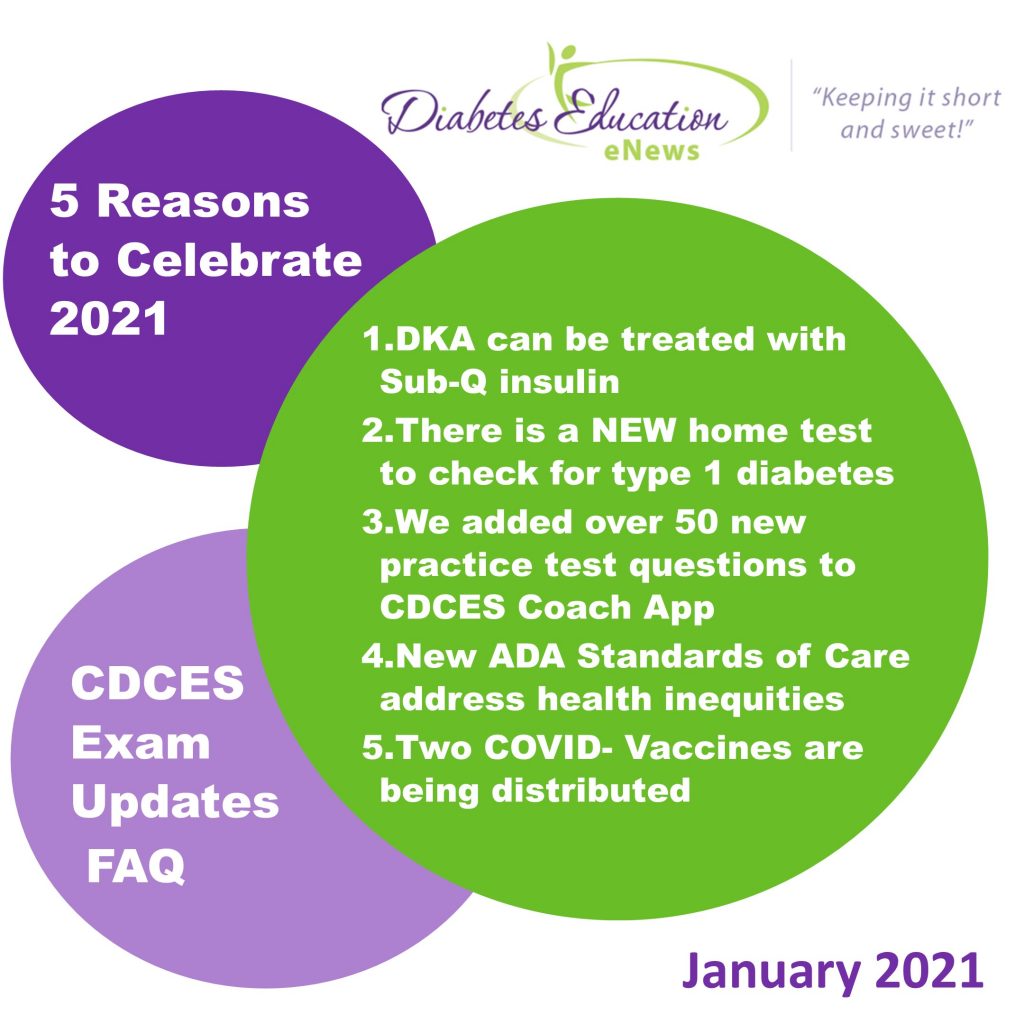
5 Reasons to Celebrate 2021
- DKA can be treated with Sub-Q insulin
- There is a NEW home test to check for type 1 diabetes
- We added over 50 new practice test questions to CDCES Coach App
- New ADA Standards of Care address health inequities
- Two COVID- Vaccines are being distributed
In this newsletter, we are excited to celebrate notable breakthroughs.
As a diabetes nurse for over 20 years, I assumed that the ONLY way to treat DKA was with an insulin drip. It turns out that a Sub-Q approach is as effective and safe. Investigate more about the steps involved in this approach in our featured article.
In the past, testing for type 1 diabetes required a provider order. Now, concerned family members can choose to get tested from home. Read more about this super easy screening test for type 1 diabetes.
Our rationale of the week brings Section 1 of the new ADA Standards on Population Health to light. This standard boldly addresses social determinants of health, with an intense focus on food insecurity and other barriers to self-care.
Lastly, this Monday, I was lucky enough to get my first dose of the Pfizer COVID-19 vaccine. I sported a sore arm for less than 24 hours and that was it. Now, I am anxiously cheering for all my family, friends, colleagues, and community to get this life-saving vaccination.
Stay safe everyone and don’t forget to get enough sleep!
Click here to read our full January 2021 newsletter.
Most Frequently Asked Exam Question – Which Standards to Study?
One of the most frequently asked questions about the CDCES Exam is the following:
Should I study this year’s ADA Standards of Care or last year’s ADA Standards of Care?
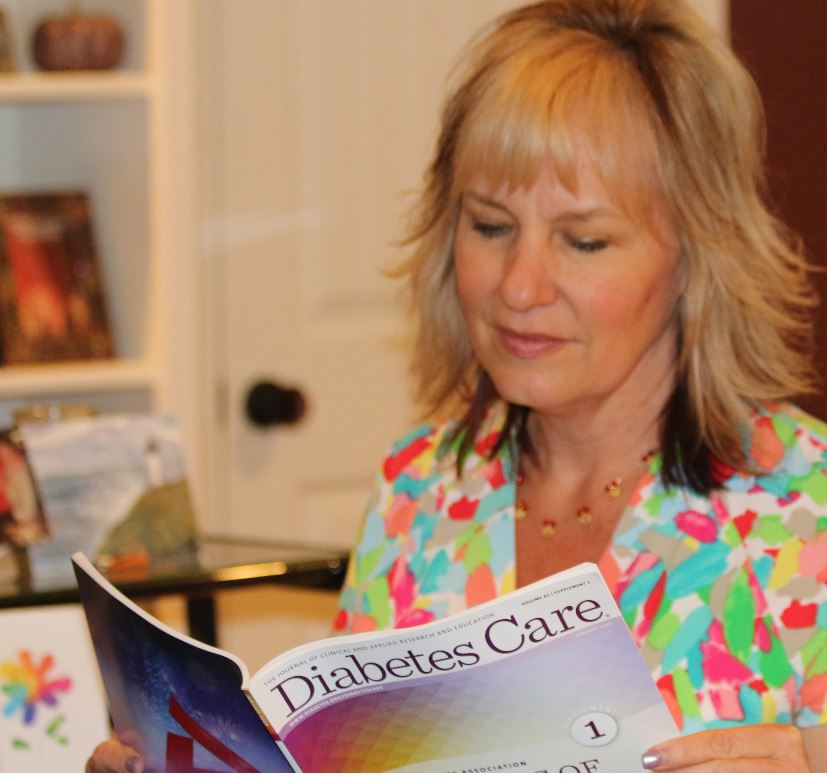
In this years exam handbook, the CBDCE provided clarification on this high anxiety topic.
CBDCE Exam Content Update Policy
Immediately – New diagnostic criteria or specific guidelines impacting diabetes care and education and/or treatment of diabetes which are released nationally and identified as effective immediately may be including in the examination at any time.
One Year – New medical advances, guidelines, or pharmaceuticals will be included in CDCES Exam no sooner than one year after the information is released.
What does this mean for us?
I have already read and reviewed the 2020 ADA Standards of Care.
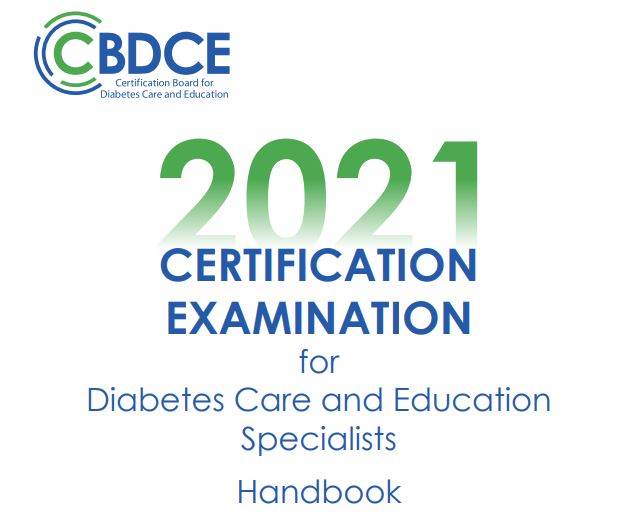
If you have already studied the ADA 2020 Standards of Care, you will be set for the 2021 CDCES Exam. Since there are no new diagnostic criteria or specific guidelines that are dramatically different from the 2020 Standards of Care.
The one exception is that there are updated diabetes management guidelines for the older population as outlined in our Older People Level 2 Course and you can review in the ADA Standards of Care, section 12.
Please see ADA Standards Summary of Revisions for more detailed information on updates for 2021.
I haven’t started reviewing the ADA Standards of Care.
Great. Please plan on studying the 2021 ADA Standards of Care, which includes all of the same content as the 2020 Standards with some additions and updates.
We are all rooting for your success! For More info:
- Download CDCES Coach App FREE for iOS or androids
- Join our Prep for CDCES Webinar FREE
January News Topics
- Treating DKA with Sub-Q Insulin
- At-Home Test for Type 1
- Which Year’s ADA Standards to Study for Exam
- Rationale of the Week – What is Causing Hypoglycemia?
Featured Items
- Level 1 Updates
- Level 3 Updates
- Virtual DiabetesEd Specialist Conference
- Free Resources Catalog
Sign up for Diabetes Blog Bytes – we post one daily Blog Byte from Monday to Friday. And of course, Tuesday is our Question of the Week. It’s Informative and FREE! Sign up below!
[yikes-mailchimp form=”1″]Accreditation: Diabetes Education Services is an approved provider by the California Board of Registered Nursing, Provider 12640, and Commission on Dietetic Registration (CDR), Provider DI002. Since these programs are approved by the CDR it satisfies the CE requirements for the CDCES regardless of your profession.*
The use of DES products does not guarantee the successful passage of the CDCES exam. CBDCE does not endorse any preparatory or review materials for the CDCES exam, except for those published by CBDCE.
Rationale of the Week | What is Causing Hypoglycemia?

In the 2021 ADA Standards of Care, there is an intentional and focused discussion of health barriers to diabetes self-management. Our January 5th Question of the Week alluded to how Social Determinants of Health can impact diabetes management. Over 60% of respondents chose the best answer!
Before we start though, if you don’t want any spoilers and haven’t tried the question yet, you can answer below: Answer Question
Question: LS has type 1 diabetes and reports to the clinic with unusually frequent hypoglycemia and some weight loss. LS appears distraught and says that since the pandemic, their work hours have been dramatically reduced and paying bills has been a struggle. Based on this information, which of the following topics would the diabetes specialist most want to explore further?
Answer Choices:
- Disordered eating
- Food insecurity
- Insulin rationing
- Diabetes distress
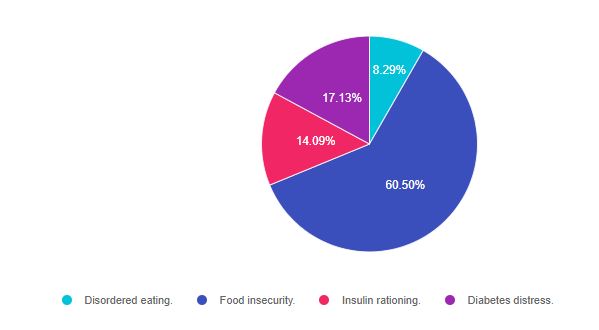
As shown above, the most common choice was option 2, the second most common answer was option 3, then option 4, and finally option 1.
Getting to the Best Answer
If you are thinking about taking the certification exam, the content of this practice test question will set you up for success. This question identifies if the test taker can identify how social determinants can impact health.
Answer 1 is incorrect. 8.29% chose this answer. “Disordered eating.” Even though this is a tempting answer, the facts in the question don’t support this answer. If LS was struggling with disordered eating, glucose levels would be elevated due to under insulinization to promote hyperglycemia and weight loss. People with diabetes and disordered eating reduce their insulin dose to induce chronic hyperglycemia which leads to weight loss.
Answer 2 is correct. 60.50% of you chose this answer. “Food insecurity.” People with diabetes are at higher risk of food insecurity. During the pandemic, many people aren’t able to work and lack access to adequate food.
In this situation, hypoglycemia coupled with weight loss indicates that LS is not consuming enough calories to match their insulin dose.
Given that LS has less income, it makes sense that they may not be able to afford adequate food. Providing LS with local resources to food banks and social services plus helping them take less insulin to prevent hypoglycemia, are both important topics to discuss during the visit.
Answer 3 is incorrect, 14.09% of you chose this answer “Insulin rationing.” If LS was rationing or taking less insulin than usual to make it last longer, they would not be struggling with hypoglycemia, but would instead be experiencing hyperglycemia.
Answer 4 is incorrect, 11.48% of you chose this answer. “Diabetes distress.” Certainly, LS is experiencing distress, but the main issue in this situation is safety and preventing hypoglycemia. The hypoglycemia is not a result of distress, it is due to lack of adequate food. Providing LS with local resources to food banks and social services plus helping them take less insulin to prevent hypoglycemia, are both important topics to address during the visit.
We hope you appreciate this week’s rationale! Thank you so much for taking the time to answer our Question of the Week and participate in this fun learning activity!
Food Insecurity – An Important Topic
Section 1 in the ADA Standards, Improving Care and Promoting Health in Populations, takes a close look at the social determinants of health that can act as barriers to self-care. As diabetes advocates, we can ask these 2 Food Security Screening questions (see slide below) to assess for inadequate access to food and provide needed resources and referrals.


Want to learn more about this topic?
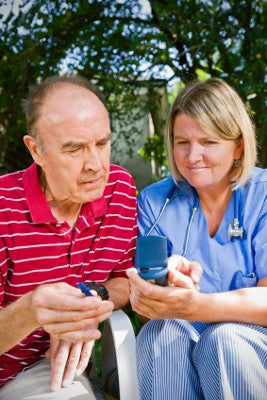
We have updated this course to reflect the 2021 ADA Standards of Care. This presentation includes the latest information on Social Determinants of health, assessment strategies, and approaches. We explore the psychosocial issues that can discourage individuals from adopting healthier behaviors and provides strategies to identify and overcome these barriers. Life studies are used to apply theory to real-life situations. A great course for anyone in the field of diabetes education or for those looking for a new perspective on assessment and coping strategies.
Topics include:
- Name assessment areas of healthy coping
- List psycho-social and emotional barriers
- Provide strategies for healthcare professionals to identify and overcome barriers
- Discuss strategies to develop an individualized diabetes education plan

Instructor: Beverly Thomassian RN, MPH, CDCES, has been Board Certified in Advanced Diabetes Management for over 20 years. She is an Associate Clinical Professor at UCSF and Touro University and a nationally recognized diabetes expert.
Sign up for Diabetes Blog Bytes – we post one daily Blog Byte from Monday to Friday. And of course, Tuesday is our Question of the Week. It’s Informative and FREE! Sign up below!
[yikes-mailchimp form=”1″]
Accreditation: Diabetes Education Services is an approved provider by the California Board of Registered Nursing, Provider 12640, and Commission on Dietetic Registration (CDR), Provider DI002. Since these programs are approved by the CDR it satisfies the CE requirements for the CDCES regardless of your profession.*
The use of DES products does not guarantee the successful passage of the CDCES exam. CBDCE does not endorse any preparatory or review materials for the CDCES exam, except for those published by CBDCE.
At-Home Test for Type 1 Diabetes

Rates of Type 1 Diabetes is on the Rise
The rates of new type 1 diabetes are increasing, especially among Black and Hispanic youth. Many people don’t develop the disease until later in life — and upwards of 85% of people with T1D have no family history of the disease. A new at-home test will be available for everyone who is interested in seeing if they have antibodies that indicate an immune mediated diabetes.
Signs of Type 1 Diabetes
- Excessive thirst
- Frequent urination
- Unexplained weight loss
- Exhaustion
- New bedwetting (especially at night)
For many families, the symptoms of type 1 diabetes come out of the blue and can be missed or attributed to other illnesses. This lack of awareness can delay life-saving treatment for type 1 diabetes.
The Juvenile Diabetes Resource Foundation (JDRF) in collaboration with Enable Bioscience has developed an at-home test so families can detect if there are antibodies for type 1. This test includes measurement of GAD, ICA and IAA2. The test is easy, simple, and can help save lives.
Diabetes runs in my family, so I did the test
Since immune-mediated diabetes runs in my family, I excitedly ordered my test kit. The instructions were easy to follow and everything I needed to ship my test card back to the lab was included. In addition, they sent an email confirming receipt of my info. Now I am just waiting for the results.
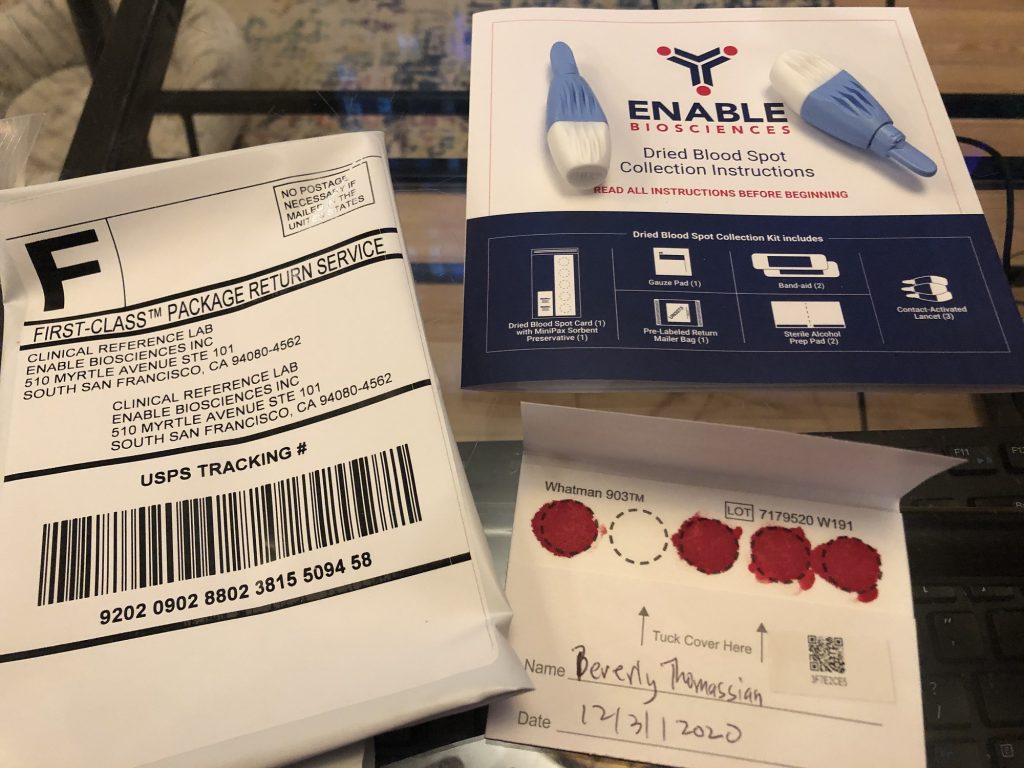
There is hope that insurance companies will cover this test in the future. But for now, the test costs a little under $60 and there is an option to request financial assistance if needed.
To raise awareness, when you order your testing kit for type 1, participants also receive a box of handbills, posters, bracelets, and other information to get the word out about signs of type 1 diabetes.

JDRF has taken a leadership role in helping to prevent and cure type 1 diabetes. Making a home blood test available to everyone is a promising step towards that.
Because T1D starts long before insulin is required, families will be able to prepare, develop a plan for further monitoring with their doctor and hopefully avoid seriously and sometimes life-threatening conditions, such as diabetic ketoacidosis (DKA), along with possible hospitalization. (JDRF)
Hope for the future
I am hopeful that there will be an effective treatment to stop the progression of Type 1 diabetes during my lifetime. Scientists and JDRF-funded research are closer than ever to developing therapies that can intervene and disrupt type 1’s disease’s progress before insulin therapy is needed.
To get your testing kit or to learn more about the work JDRF is doing, please click here for more info.

Sign up for Diabetes Blog Bytes – we post one daily Blog Byte from Monday to Friday. And of course, Tuesday is our Question of the Week. It’s Informative and FREE! Sign up below!
[yikes-mailchimp form=”1″]Accreditation: Diabetes Education Services is an approved provider by the California Board of Registered Nursing, Provider 12640, and Commission on Dietetic Registration (CDR), Provider DI002. Since these programs are approved by the CDR it satisfies the CE requirements for the CDCES regardless of your profession.*
The use of DES products does not guarantee the successful passage of the CDCES exam. CBDCE does not endorse any preparatory or review materials for the CDCES exam, except for those published by CBDCE.








